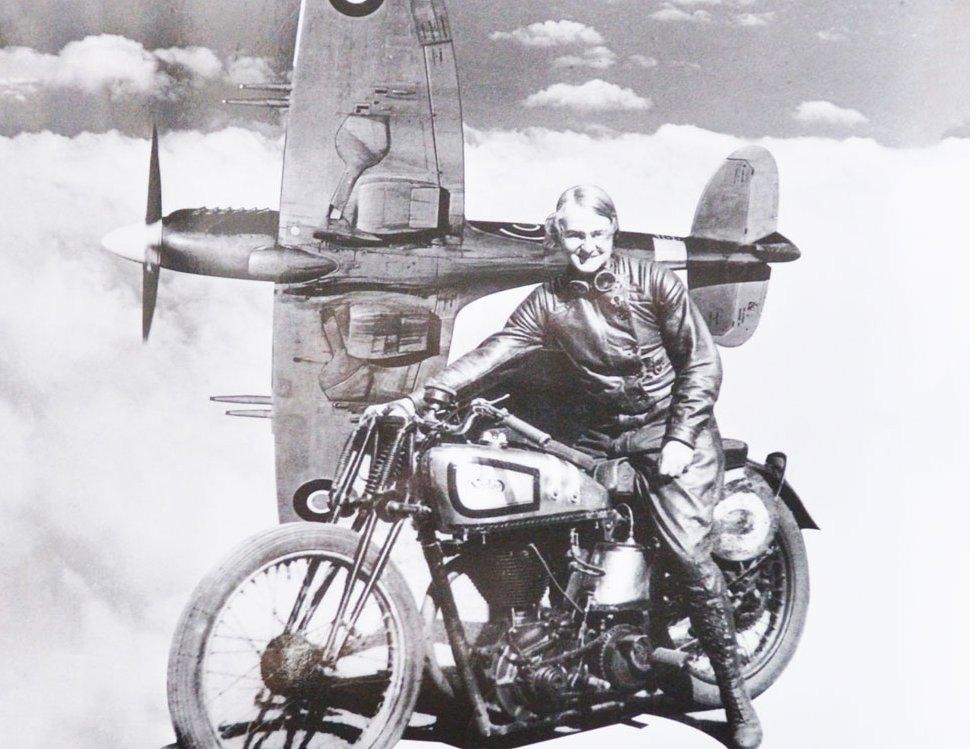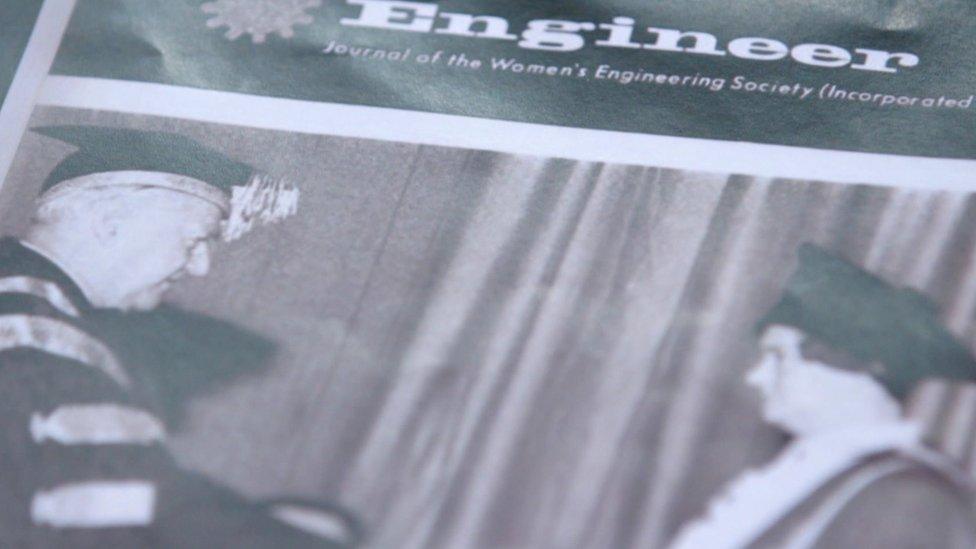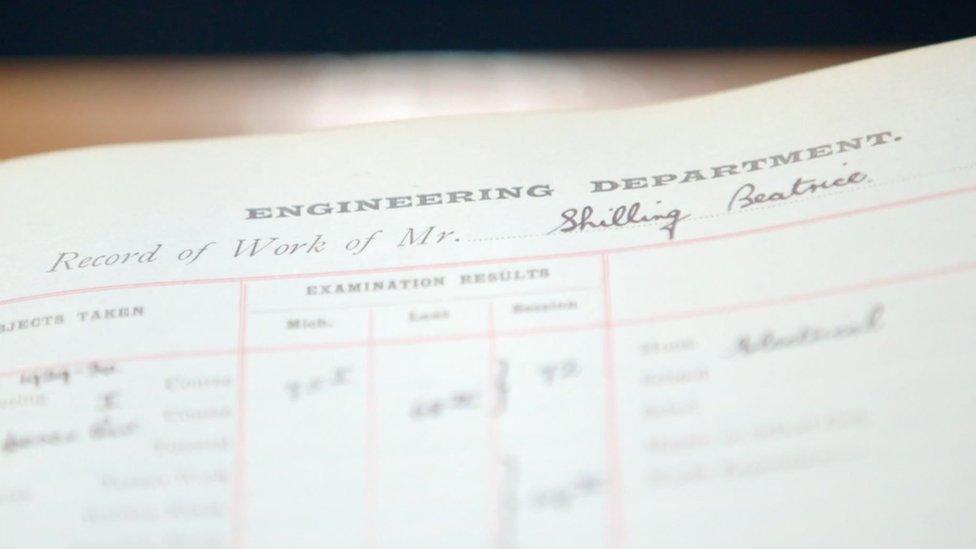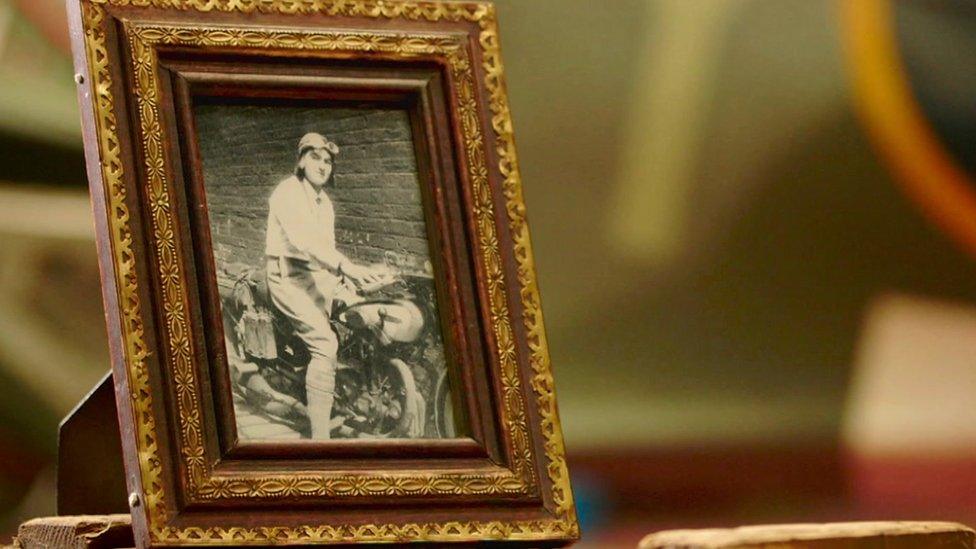Beatrice Shilling: Pioneering engineer's genius 'helped win World War Two'
- Published

Meccano fan, engineering genius, motorbike racer and World War Two hero - Beatrice Shilling
In what was then very much a man's world, a young woman's ingenuity saved many pilots' lives and arguably helped the Allies win World War Two.
As the Battle of Britain raged in the summer of 1940, a fatal flaw in the design of engines used in two of the RAF's mainstay aircraft - the Hurricane fighter-bomber and the iconic Spitfire fighter plane - became apparent.
When they dived and encountered negative g-forces, the carburettor in their Rolls-Royce Merlin engines would often flood, resulting in them cutting out - a pilot's worst nightmare in a dogfight.
The solution to the problem was discovered by Beatrice Shilling, a pioneering young engineering graduate of the University of Manchester.

As a child Beatrice Shilling said she played with Meccano and spent her pocket money on penknives, an adjustable spanner, a glue pot and other simple tools
Born in 1909, in Waterlooville, Hampshire, Beatrice - universally known as Tilly - was obsessed with engines from early childhood.
"As a child I played with Meccano," she recalled in an interview with Woman Engineer magazine. "I spent my pocket money on penknives, an adjustable spanner, a glue pot and other simple hand tools."
"From a child she was pulling engines apart," said Dr Christine Twigg of the university's science and engineering faculty. "Her real passion was mechanical engineering."

Tilly was one of the first two female graduates in any engineering course at The University of Manchester in 1932
Her enthusiasm and natural ability soon took Tilly to study a degree in electrical engineering at what was then called the Victoria University of Manchester.
She was one of only two female engineering graduates from the university in 1932.
Women were so under-represented at the time that her student record card did not have female titles as an option to be recorded.
Tilly was not content to merely study the theory of engineering though.
After completing an MSc, specialising in looking at the piston temperatures of high speed diesel engines, she took up motorcycle racing.
Fitting her bike with a revolutionary supercharger, she achieved speeds of 106mph, said Dr Twigg, and was recognised with the Brooklands gold star for outstanding performances in track and road racing.
In 1936, Tilly was snapped up by the Royal Aircraft Establishment (RAE) in Farnborough, Hampshire, which became a leading specialist in aircraft carburettors.

Engines were liable to cut out when planes dived, putting pilots in great danger
Four years later, the Allies were worried about the engines of their Hurricanes and Spitfires conking out in dogfights.
Keith "Mad Dog" Maddock is the chief engineer at Hangar 42, a World War Two aircraft hangar which is now used to reconstruct old Spitfires.
When the planes were in negative g-force, he said, the carburettor would flood causing the engine to stall or even totally cut out, putting "pilots in grave danger".
He said the Germans had no such problem and could execute steep dives without any problem.
Mr Maddock said: "Spitfires had to typically go into a half-roll to keep the fuel in the bottom of the tank, and dive on. By which time [your enemy] has gone - and that is the problem - you have lost your opportunity."
Tilly made a small but "very, very important" adjustment which Mr Maddock said solved the RAF's problems at a stroke and allowed the Allies to match the mighty Luftwaffe.
"What Tilly Shilling came up with was the idea of putting a baffle in there - a diaphragm to stop fuel surge," he said.
The RAE restrictor, external was "a war-winning modification, without which we would have suffered... defeat," said Mr Maddock.
"Beatrice Shilling helped us to win World War Two - of that there is no doubt."

She was appointed an OBE in recognition of her work in 1947
Tilly was appointed an OBE in recognition of her work in 1947.
She is understood to have continued working at RAE until retiring in 1969.
Tilly died in 1990.
Rachel Brealey, director of operations at the University of Manchester's science and engineering faculty, said: "Beatrice Shilling is such an inspiration to our students.
"She made such a significant impact to engineering and responded so brilliantly to the technical challenges of her time."
Beatrice Shilling's story features in Invented in the North West. BBC One on Friday 23 June at 19:30 BST. It will then be available on the BBC iPlayer